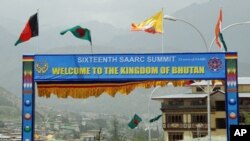The most important annual meeting of governments in the South Asian region is underway, being hosted for the first time by the small Himalayan kingdom of Bhutan. Contentious diplomacy between two SAARC members is overshadowing the South Asian Association for Regional Cooperation summit.
The long-standing tension between the region's giant, India, and its neighbor, Pakistan again has been thrust to the forefront of the yearly South Asian Association for Regional Cooperation conference.
There is intense speculation about whether the summit will see merely a hand-shake or a formal meeting Wednesday between Indian Prime Minister Manmohan Singh and his Pakistani counterpart, Yousuf Raza Gilani.
Summit leaders are poised to approve what is being billed as a breakthrough trade and services agreement.
SAARC Secretary-General Sheel Kant Sharma promises negotiations will immediately begin regarding specific sectors before the pact is ratified.
Sharma, a veteran Indian diplomat, says it will significantly benefit South Asia's people because the services sectors compose about half the total of the economies of most SAARC members.
"So, if you bring them together, there is a lot of scope for coordination. Service sector also deals with people, so there is a people-to-people connectivity involved when you talk of trade and services," Sharma said. "Also, when trade and services increases there is employment generation. The benefits will accrue in a multi-faceted manner."
Officials involved with the trade negotiations tell VOA News the agreement is significant because it will mean that if two countries agree to open up a sector between themselves, they will generally be obligated to expand it to other SAARC members.
Foreign ministers of the SAARC nations - Afghanistan, Bangladesh, Bhutan, India, Maldives, Nepal, Pakistan and Sri Lanka - also have agreed to put forward a collective statement on climate change at upcoming international forums. But it is unclear how it will balance the position of India, which is reluctant to take steps that could hinder economic growth, with those of small nations such as Bhutan and Maldives which have strong positions on environmental protection.
The SAARC summit is attracting several high level observers from outside the region. They include a Chinese vice foreign minister, Iran's foreign minister and an American assistant secretary of state. Australia, Burma, the European Union, Japan and South Korea have also sent diplomatic observers.





